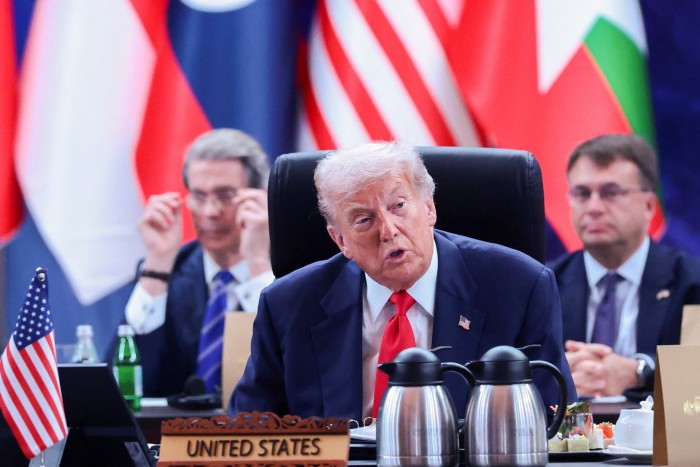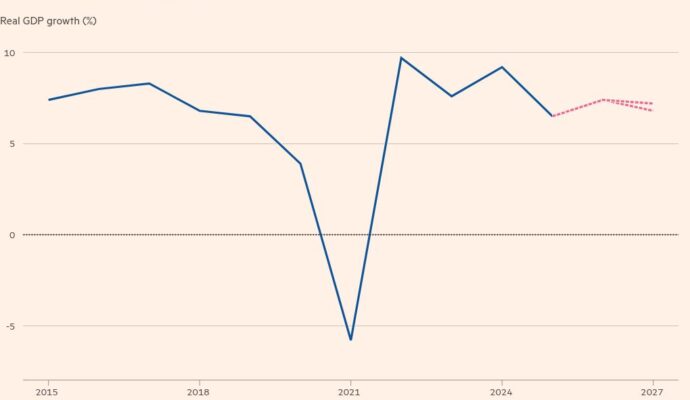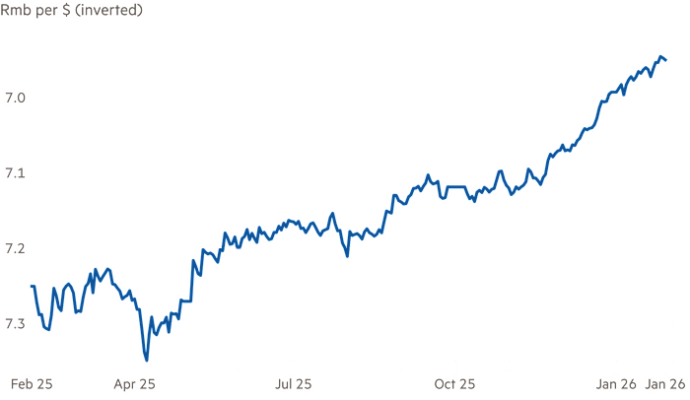Unlock the White House Watch newsletter for free
Your guide to what Trump’s second term means for Washington, business and the world
US officials expect China to delay introducing export controls on rare earths, after two days of talks in Malaysia raised hopes that Donald Trump and Xi Jinping would agree to extend a trade truce at their high-stakes summit this week.
Beijing’s announcement of the sweeping controls this month triggered a sharp escalation in trade tensions between the world’s two biggest economies and threatened to torpedo plans for Trump and Xi’s first summit since 2019.
Following a weekend of negotiations in Kuala Lumpur, a senior US official told the Financial Times that Beijing’s likely delay was prompted by Washington’s threat of additional tariffs as well as pressure from other countries that rely on the minerals.
US Treasury secretary Scott Bessent told ABC News that he expected China would delay the controls on minerals used in fighter jets, smartphones and electric vehicles for a year while Beijing re-examined them. They are due to come into force in coming weeks.
Li Chenggang, the top trade negotiator in China’s delegation, did not comment on a possible delay but told reporters that Beijing and Washington had reached a “preliminary consensus” on export controls, fentanyl and extending a trade truce that is set to expire on November 10.
The truce, which the two sides last extended in August, paused the 145 per cent tariffs that Trump imposed on China when he started his trade war in April. Xi retaliated by slapping 125 per cent levies on US exports.
The US official told the Financial Times that they expected the truce would be extended by more than the previous 90-day period.
“We think it would give great stability and great certainty to the global economy and to the US-China relationship,” they said.

In a separate interview on CBS, Bessent said that Trump’s threat this month to raise US tariffs on Chinese imports by an extra 100 per cent was “effectively off the table”.
“I can tell you we had a very good two days,” the Treasury secretary said.
The prospect of the US and China extending their truce came after Trump arrived in Malaysia on Sunday as part of a week-long trip to Asia — and his first to the region since returning the White House.
The US president flies to Japan on Monday to meet Sanae Takaichi, the new prime minister, before heading to South Korea for his meeting with Xi on Thursday.
In a blitz of deals on Sunday, Trump struck trade and mineral agreements with Malaysia and Cambodia, as well as agreeing frameworks with Thailand and Vietnam.
He also presided over the signing of a peace treaty between Cambodia and Thailand following their violent border dispute this summer.
On Sunday, Bessent, who led the US delegation, said the sides had agreed on a “very positive” framework for Trump and Xi to approve when they meet at the Asia-Pacific Economic Cooperation forum in South Korea.
China’s state-run news agency Xinhua said Washington and Beijing had reached a “basic consensus” on a framework to “address their respective concerns”. It said the negotiations in Malaysia — the fifth round between the parties this year — had covered exports controls, levies against Chinese shipping, fentanyl and agricultural trade.
Beijing’s plan to tighten its grip on rare earths triggered alarm in Europe, with European Commission president Ursula von der Leyen warning last week that the risk of a crisis in their supply was “no longer a distant risk”.
A second US official told the FT that “it was the president’s very clear message . . . that the rare earths regime was unacceptable and would result in massive countermeasures”, adding that it “was really important that other countries . . . stood up”.
“When you have the EU say we’re drawing up countermeasures against China . . . that is not something they usually do,” they said.
The weekend of talks had also yielded a commitment from China to buy American soyabeans, the first US official told the FT, adding that Beijing had agreed to “stop using soyabeans as pawns in the global trade game”.
The Trump administration has faced mounting pressure from US farmers after China curbed purchases of US soyabeans.
China had also shown interest in taking concrete measures to stop the export of chemical ingredients for fentanyl, the deadly synthetic opioid, that could merit “a little bit of relief from our side”, they added.
The US imposed a 20 per cent tariff on Chinese goods as a punitive measure related to the fentanyl problem.


